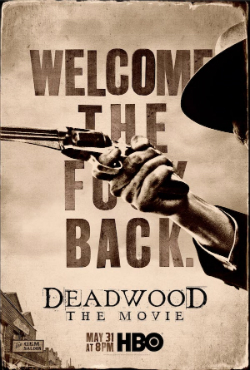In 1889, as
the town of Deadwood celebrates South Dakota’s new statehood, Calamity Jane
Canary (Robin Weigert) returns to rekindle a romance with Joannie Stubbs (Kim
Dickens), now the owner of the Bella Union casino/brothel. George Hearst
(Gerald McRaney), a gold-hungry mining magnate turned U.S. Senator from
California, returns as well to pursue land for new telephone lines.
Unfortunately for him, the land’s owner, Charlie Utter (Dayton Callie), refuses
to sell. Meanwhile, Seth Bullock (Timothy Olyphant), once more a U.S. Marshal
keeps the peace while his business partner, Sol Starr (John Hawkes), must
contend with his lover Trixie’s (Paula Malcomson) antagonism toward Hearst. Finally,
Trixie’s former employer, saloonkeeper Al Swearengen (Ian McShane), is
suffering from liver failure. A sudden death threatens to throw the entire town
into upheaval once again.
When HBO’s
Deadwood series ended in 2006 after a
three-season run, it was disheartening not only because there were more stories
left to tell but because the then-finale was grim even by the harsh standards
of this show: Hearst, having bullied and murdered his way to controlling the
area’s gold mines and political offices, leaves victorious as everyone else
must pick up the pieces. A follow-up movie was long-rumored, yet it seemed like
it would never happen right up until the point when it actually did. Deadwood: The Movie never quite approaches
the series at its best, but it is still a welcome and rewarding experience.
Astonishingly,
given the decade-plus gap between series and film, the latter was able to
return nearly all of the former’s cast (the major exceptions being the late
Powers Booth and Titus Welliver, who was busy appearing in Bosch). Even more astonishingly, series creator David Milch wrote
the script while battling the effects of Alzheimer’s. His dialogue remains
sharp and retains Deadwood’s unique blend
of profanity and lyricism. The returning talents allow for a strong sense of
continuity, and the movie feels like it easily could have been a flash-forward
episode from 2007 with everyone in old-age makeup.
With that
being said, there are places where maintaining this continuity strains belief.
Doc Cochran (Brad Dourif) was last seen as a middle-aged man suffering from tuberculosis
in 1879 yet appears alive and well ten years later. Wu (Keone Young) has picked
up little additional English in the intervening years, and Tom Nuttall (Leon
Rippy) and “General” Fields (Franklin Ajaye) remain in town despite their historical
inspirations having moved on.
This is
not to say that there is no character development. The Bullock of the series
was a notorious hothead while the movie finds him somewhat more rational
(albeit no less formidable in a gunfight). Ill health having brought an end to
his throat-slitting days, Swearengen takes on an almost grandfatherly aspect,
albeit one couched in foul-mouthed pragmatism. Malcolmson and Weigert steal the
show, however, as Trixie and Jane experience the most growth. The former,
Swearengen’s top-earning prostitute when the series opened, is an expectant
mother and the town’s moral compass, fearlessly calling out Hearst’s past
misdeeds despite the potential dangers of doing so. The latter, who spent much
of the series a drunken mess as she mourned the death of mentor Wild Bill Hickock,
regains both confidence and competence. On the opposite end of the spectrum, so
much of the series seemed to revolve, directly or indirectly, around the plight
of widowed woman of wealth Alma Garrett (Molly Parker) that her diminished importance
here is a strange sight.
Television
has pushed plenty of boundaries since Deadwood
went off the air in 2006, and what was once raw and shocking may have lost a
measure of potency. Even in a vacuum, however, there is an inescapable sense
that the movie’s plotting plays it safe, sacrificing surprise for satisfaction.
And yet, if this truly is the end, it’s a fitting send-off: one that brings
some measure of closure without resorting to cheap or cheesy remedies.

No comments:
Post a Comment